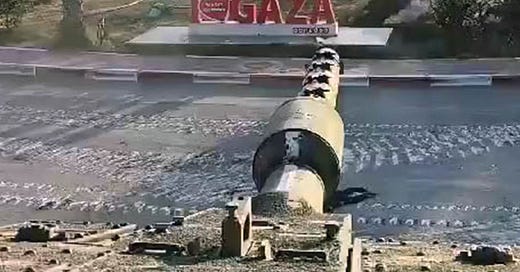Israel's Rafah Operation Begins as Ceasefire Talks with Hamas End Without Deal
Plus: Hezbollah-Israel conflict in southern Lebanon; Houthis' operations in the Red Sea.
Hello and welcome to Inshallah! I’m here to bring you the top stories from the Middle East. Come along on this journey with me to stay informed about the latest news and trends in the region.
Israel initiated military operations in Rafah this week, taking control of the border crossing with Egypt and closing a vital entry point for humanitarian aid into the Gaza Strip.
This comes after Hamas accepted a ceasefire proposal facilitated by Qatar and Egypt after weeks of negotiations.
The proposal involves three six-week stages leading to a permanent ceasefire, Israeli withdrawal from Gaza, and the lifting of the siege. Key elements include temporary cessation of hostilities, prisoner exchanges, and coordination of humanitarian aid.
Israel dismissed the ceasefire deal as falling short of its demands. Prime Minister Benjamin Netanyahu stated that the proposal did not meet Israel's core requirements.
The main disagreement revolves around the interpretation of "sustainable calm." Israel's proposal left it open-ended, while Hamas's version insists on a permanent ceasefire and Israeli withdrawal. Israel opposes explicit calls for a permanent ceasefire until its military objectives are met: dismantling Hamas and releasing hostages. Another point of contention is Israel's veto power over the release of certain Palestinian prisoners, which Hamas's proposal eliminates. Marwan Barghouti, a prominent Palestinian figure, was a subject of debate for potential prisoner swaps, with conflicting reports about Fatah's stance on his inclusion.
Despite preparations for a ground incursion to meet military objectives, global leaders and aid organizations caution against escalating operations in Rafah, home to over a million civilians.
President Joe Biden announced a potential halt to American weapon shipments to Israel if a major invasion of Rafah occurs, acknowledging civilian casualties in Gaza.
Hezbollah-Israel conflict in southern Lebanon
Meanwhile, ongoing military confrontations persist between Israel and Hezbollah along Lebanon's southern border.
Israel conducted airstrikes in south Lebanon, while Hezbollah launched explosive drones and rockets at Israeli targets.
The clashes have resulted in casualties on both sides, including three Palestinian fighters from the Quds Brigades and at least one Hezbollah fighter.
The conflict, running parallel to the Gaza war since October, has displaced tens of thousands and heightened concerns of a larger-scale war between Hezbollah and Israel in the Lebanese territory.
Hezbollah's attacks targeted Israeli military positions in Metula, Ya'ara, and Biranit, among others. Israeli strikes reportedly targeted numerous towns and villages in south Lebanon.
Houthis' operations in the Red Sea
Yemen's Houthis, led by Abdul Malik al-Houthi, announced intentions to target ships associated with supplying goods to Israel as part of escalating retaliation against Israeli aggression in Rafah. Months of Houthi attacks in the Red Sea have disrupted global shipping routes, leading to military responses from the United States and Britain.
That’s a wrap for this week! Thank you for joining Inshallah! Don’t forget to share and subscribe.
About me
My name is Dario Sabaghi, and I am a freelance journalist interested in international news with a focus on the MENA region.
Check out my work at dariosabaghi.com.
You can follow me on Twitter: @DarioSabaghi
Errors and editing mistakes may occasionally occur. I appreciate your feedback and take all complaints seriously. Please get in touch with me on Twitter to report any issues, and I will do my best to rectify them promptly.
Cover photo: Google




